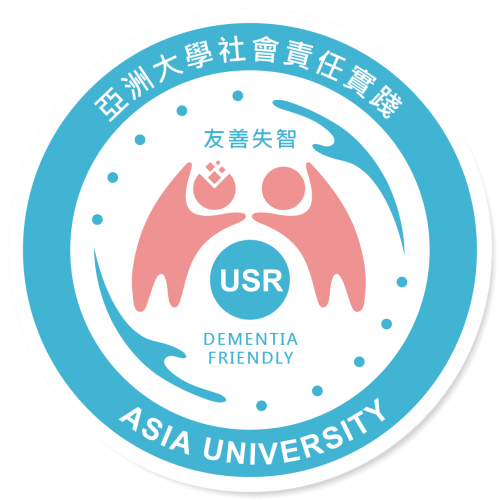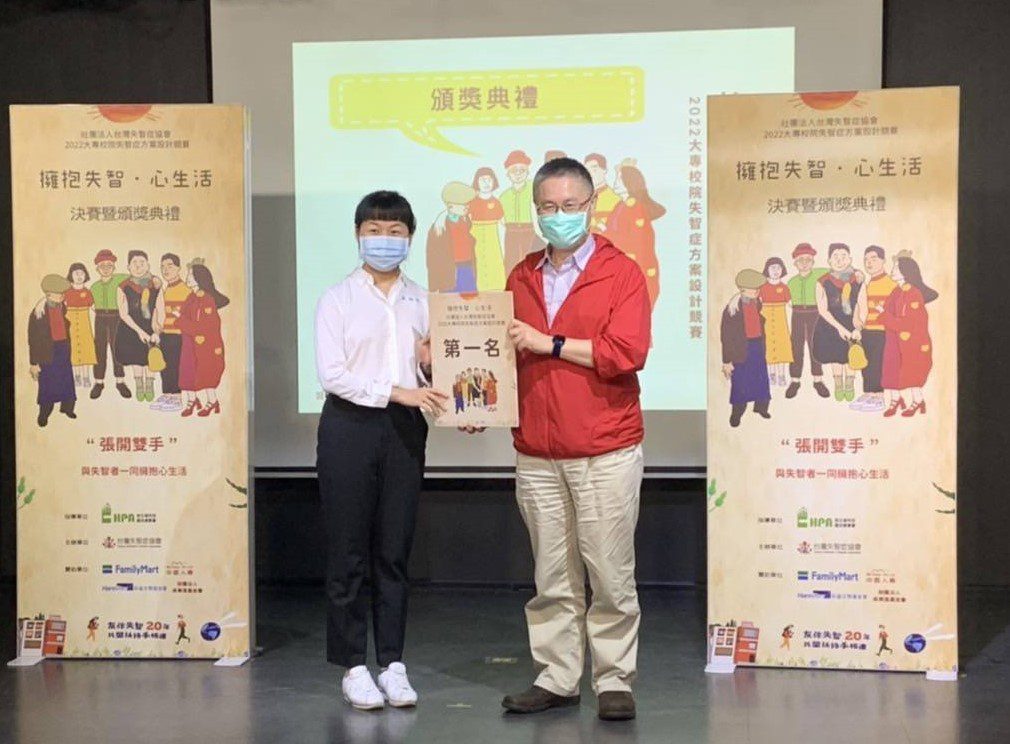Welcome!
Asia University’s Social Responsibility Practice Project
Building Age and Dementia Friendly Communities:
Dementia Literacy x Wisdom Upgrade x Intelligent Assistance
Introduction
Asia University’s Social Responsibility Practice Project has been deeply involved in Pei-Liu, Liu-Gu, Pen-Hsiang, Jiu-Zheng, Wu-Fu, Ji-Fong communities in Wufeng for 5 years, starting from the freshman course "Wufeng Learning • Learning Wufeng", slowly stacking up a strong feeling for Wufeng. In order to enable our elders to live in Wufeng healthy and settle down, take care of themselves autonomously, "Preventing and Delaying Dementia" and "Dementia-Friendly" are issues of health promotion and long-term care for the elders jointly invested by Asia University and Wufeng.
Teachers and students in Asia University cooperate with Asia University Hospital and the local industries, to implement the first phase of “Innovative Integrated Care Action Plan for Preventing Dementia (seed type)” and the second phase of “Building a Dementia-Friendly Town for the Elders” (Budding type)”, with a problem/project-based learning loop, and promote at least 69 innovative teaching courses to connect with the locals. Besides, a total of 8,925 teachers and students participated, and a total of 13,647 local people were affected. We step by step go deep into the community, take it personally, and devote ourselves to health care of the elderly in Wufeng.

Awards for teachers and students





Featured Project Experiences
Asia USR Go !
A Team for Dementia Home Screening
WALK DOWN THE ATAABUl ● GET A STORY FROM THE ELDERS
This year, our community nursing internship is particularly different!!
The teachers and students formed a teams of dementia home screening, and then walked down the streets and alleys in Ataabu. The most impressive thing is recorded. The 78-year-old Mr. Zhang lives with his daughter-in-law and foreign domestic helper in the middle ancient townhouse. Mr. Zhang has a dull personality, and his memory has deteriorated since the death of his mother. He moves freely, eats well and is not noisy, but he urinates anywhere. Even after being examining by doctors in the hospital, he still urinates anywhere. Without any choice, his daughter-in-law hires a foreign domestic helper to take care of him. Mr. Zhang responds slowly, and speaks gently and slowly. His daughter-in-law may sometimes speak for him with helpless and impatient speech. We also felt Mr. Zhang’s pressure. During this period, we asked Mr. Zhang whether he felt tired and need to rest, he looked at his daughter-in-law and seemed to be waiting for her instruction. The daughter-in-law looked at Mr. Zhang with the same attitude and said, “It’s up to you!”, and said in front of Mr. Zhang without disguising: “He loves to stay in the room, lying on that bed, even if he is staring at the ceiling.” Faced with Mr. Zhang’s incontinence, she also feels incredible. He could walk, eat and talk on his own, but he could not go to the toilet on his own, or at least told his family that he wanted to defecate. The daughter-in-law even suspected that Mr. Zhang was deliberate, and constantly stressed to the old man, “You want to defecate, you have to say it! If you don’t say, how can we help you…” He doesn’t say, how can we help? “Speak out! I will help you solve it.” It is a normal logic, but what if he is demented?
The caregiver paid but received no response!!
The daughter-in-law has also made some efforts. Once, she used the long-term care 2.0 professional home service, hoping to improve the incontinence condition. The therapist and Mr. Zhang established a good relationship. Mr. Zhang was always look forward to the therapist’s visit and frequently asking the daughter-in-law that when the therapist would come. But the daughter-in-law was troubled by Mr. Zhang’s reaction, so she stopped this treatment. As a result, Mr. Zhang’s incontinence still did not improve, and the daughter-in-law also hired a foreign domestic helper as a last resort. She thought “I have already paid like this, why don’t you say anything? He still shows an innocent look.” The daughter-in-law thought her dignity has been ruined. Mr. Zhang contaminated his body with stool, emitting an unpleasant smell spreading in the home, tearing up family relations.
Finding solutions to build dementia care awareness!!
The daughter-in-law has also made some efforts. Once, she used the long-term care 2.0 professional home service, hoping to improve the incontinence condition. The therapist and Mr. Zhang established a good relationship. Mr. Zhang was always look forward to the therapist’s visit and frequently asking the daughter-in-law that when the therapist would come. But the daughter-in-law was troubled by Mr. Zhang’s reaction, so she stopped this treatment. As a result, Mr. Zhang’s incontinence still did not improve, and the daughter-in-law also hired a foreign domestic helper as a last resort. She thought “I have already paid like this, why don’t you say anything? He still shows an innocent look.” The daughter-in-law thought her dignity has been ruined. Mr. Zhang contaminated his body with stool, emitting an unpleasant smell spreading in the home, tearing up family relations.
Finding solutions to build dementia care awareness!!
After the home care visit, we discussed the challenge of taking care of the family with dementia. First, the students commented on the daughter-in-law’s attitude towards Mr. Zhang. Although students were very sympathetic to Mr. Zhang, the attitude of directly blaming the daughter-in-law was not objective. We tried to understand the helplessness of the daughter-in-law who wanted to change but could not change, and analyzed the caregiver’s emotional load and blind spots. Then we searched the literature to understand the mechanism of incontinence in the elders with dementia, and found that incontinence is closely related to constipation. The daughter-in-law also mentioned that Mr. Zhang has constipation. In addition, because of the confusion of space, the toilet may not be found. Therefore, our team suggested that the daughter-in-law deal with the constipation problem of Mr. Zhang first, such as increasing fiber intake and drinking water, assisting Mr. Zhang to exercise moderately, teaching foreign domestic helpers to conduct abdominal massage, and taking Mr. Zhang to the toilet regularly. The location of the toilet should be clearly marked at home. Instructions on how to go to the toilet can be posted in the toilet. We also refer Mr. Zhang to the community care centers in the neighborhood, so that local public welfare groups can continue the good circle of community mutual assistance.
Such stories are played out in different dementia families every day. By home care visiting, analyzing the context behind the events, understanding the physical and mental loading of care, find out the care needs and focus of dementia families, and providing nursing professional care. Let care knowledge not only limited to flat textbooks, but walk into the community to establish a connection and relationship, and then, see your professional value from the real world. Let our learning not only a professional growth but also a social responsibility.

